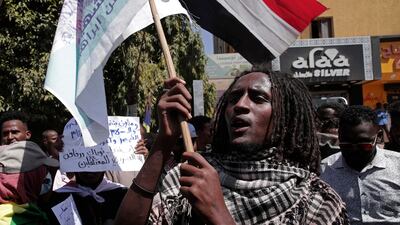Sudan’s military has intensified its crackdown on the opposition, arresting politicians and activists at the weekend and killing two people in clashes on Monday as demonstrators rallied against last year’s coup.
Mohammed Suliman, a former member of the military-led ruling Sovereign Council, was among those arrested.
He was also the deputy head of a state agency mandated with dismantling the legacy of dictator Omar Al Bashir, who was deposed by the military in 2019 after 29 years in power.
The agency’s official name is the Committee to Dismantle the Regime of June 30 1989, a reference to the military coup that brought Al Bashir to power.
“The number of people detained arbitrarily and without criminal charges has exceeded 100,” the Sudanese Professionals’ Association said on Monday.
The SPA is a core member of the pro-democracy movement opposed to military rule and is calling for civilian rule.
Mr Suliman was arrested earlier on October 25, the day of the coup. But he was released a month later under a deal between the military and the prime minister at the time, Abdalla Hamdok.
The Unionist Alliance party, of which Mr Suliman is a senior member, said he was detained on Sunday when security forces intercepted his car as he drove to his home in Khartoum.
Police officials said security forces arrested two other former members of the committee, also on Sunday.
They said the trio faced corruption charges linked to their work for the committee, which army chief and coup leader Gen Abdel Fattah Al Burhan dismissed when he seized power on October 25.
Wagdi Saleh, another member of the dismissed committee, was arrested last week.

The military says the former members of the committee were not detained for political reasons but on the basis of a criminal investigation that led to arrest warrants issued by prosecutors.
The SPA dismissed the allegations of corruption as fabrication. It said military officers and prosecutors who served on the committee faced no charges, including Gen Yasser Al Atta, a member of the Sovereign Council led by Gen Al Burhan.
The SPA said it “calls on the Sudanese people to be aware of these conspiracies” that were an attempt to restore Al Bashir’s regime through an alliance of the coup leaders and supporters of the former president.
The latest arrests appear to be a continuation of a crackdown against pro-democracy politicians and activists who are outspoken critics of the military.
Last week, military authorities also rearrested Khalid Omar, a minister in Mr Hamdok’s transitional government and a senior member of the opposition Sudanese Congress Party.

The October 25 coup has upended Sudan’s democratic transition and drew strong condemnation from western powers, with the US and the World Bank suspending hundreds of millions of dollars’ worth of aid.
They are demanding a return to civilian rule and justice for the families of at least 81 people killed by security forces during street demonstrations against the coup. Nearly 3,000 people have also been wounded.
Protesters on Monday marched in Khartoum and its twin city of Omdurman to demand a fully civilian government to lead the transition.
Two protesters were killed. One was shot in the neck and chest in Khartoum and the other shot in the chest in Omdurman, according to the Central Committee of Sudan Doctors, a group aligned with the pro-democracy movement.
There were protests in other cities, including Port Sudan on the Red Sea, Wad Madani south of the capital and in western Darfur.
In Khartoum, protesters carried Sudanese flags and red balloons to mark Valentine’s Day and banners declaring: “Today is the nation’s love day.”
They also held up banners with pictures of killed protesters.

“We are demanding the release of resistance committee members and politicians who were unjustly arrested and some of whom are facing fabricated charges,” protester Khaled Mohamed said.
Gen Al Burhan in a weekend TV interview renewed his pledge to hold elections next year, but made it clear that the military would not surrender power to civilians unless a political consensus has been reached or an elected government was in office.
He also denied that he had any political ambitions. Additional reporting by AP and AFP


